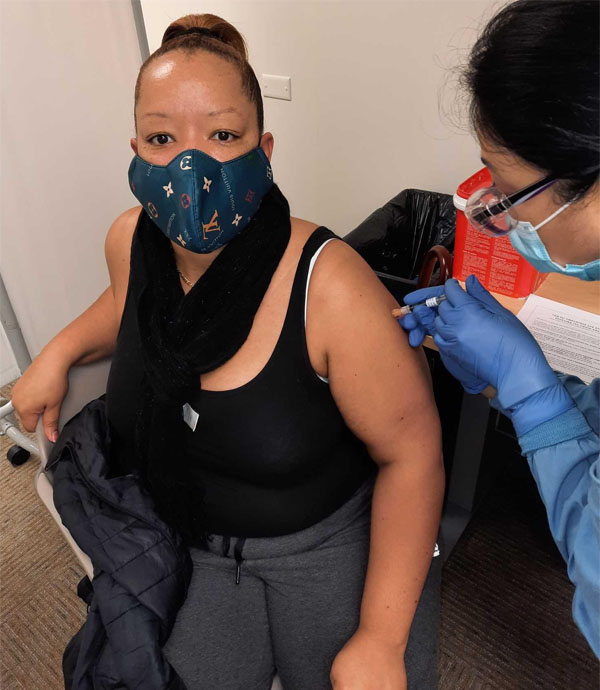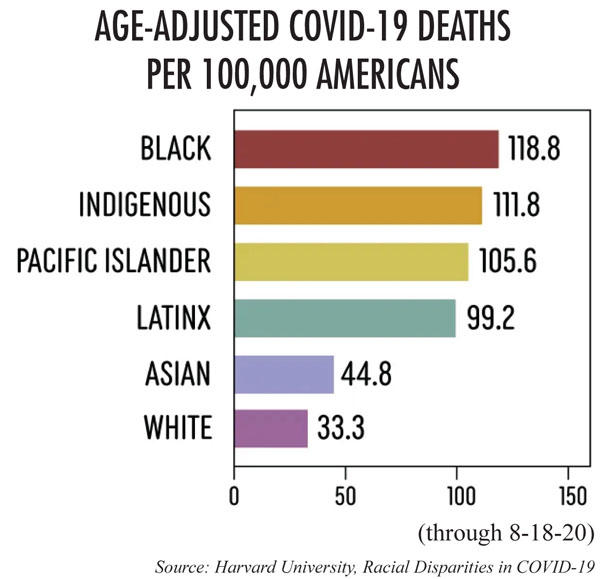OPINION
I’m a Union leader and a Black woman. Here’s why I got the COVID-19 vaccine.
By SHERRONDA JAMERSON
(Jan. 15, 2021) — On Jan. 2, I received my first dose of the Pfizer COVID-19 vaccine. This wasn’t a decision I took lightly.
I’m a Mental Health Practitioner Clinical Specialist at Harborview Medical Center in Seattle where I’ve worked for the past six years. I currently sit on the Harborview Ethics Committee and the Equity, Diversity, and Inclusion Committee. I’m also the president of AFSCME Local 3488.
 As a Black mental health care provider and union leader, I have gained the trust and respect of many in my workplace and in the community. As a leader, I’ve never asked anyone to do something that I wouldn’t do.
As a Black mental health care provider and union leader, I have gained the trust and respect of many in my workplace and in the community. As a leader, I’ve never asked anyone to do something that I wouldn’t do.
I know people are scared. Being fearful is to be expected. The truth about my experience has produced curiosity and hope for those who are skeptics about the vaccine.
WEIGHING THE RISKS
Scientists are still learning about the coronavirus and its short- and long-term impacts, and they are still learning about the vaccine and its side effects.
I’ve come to the conclusion that taking the vaccine and contracting COVID-19 each come with risk. For me and for many others, the long-term risks associated with COVID far outweigh the mild side effects of the vaccine.
After my first dose, I experienced hot flashes for a few hours and a sore arm the following day.
That is very different than not being able to breathe long-term, being hospitalized, facing death, infecting others, fatigue, loss of smell and taste, memory and cognitive issues, and lost wages.
A PERSONAL DECISION
Many people of color have valid fears about receiving a newly developed vaccine—particularly in a country with a long history of unethical medical practices in communities of color, from the lethal Tuskegee Syphilis Study to allegations of abuse made last year by immigrant women detained in Georgia.
Ultimately, this is a personal decision. My suggestion is to do your own research, draw your own conclusion, and make up your own mind. Here’s some of what I’ve learned from Black radio stations, community outreach, and other Black healthcare providers:
● Despite the vaccine being fast-tracked, researchers spent thousands of hours in development and testing.
I trust National Institute of Allergy and Infectious Diseases Director Dr. Anthony Fauci and National Institutes of Health Director Dr. Francis Collins because they’re experts at the top of their field. These experts want to ensure Americans of color that people of color were included in research, development, and trials. They have provided reassurance that this vaccine is safe.
● During trainings held by the University of Washington, I learned how the vaccine was created and what it actually does inside the body.
● Many Black leaders in healthcare are reaching out to share positive experiences with the vaccine.
Working in a research hospital, I know people who worked on the vaccine, including a lot of people of color who took it before I did. They kept me posted on their experiences and their side effects—quite a few people reported only having a sore arm for a day. I asked an African American researcher if she was willing to take the vaccine. She said she would take it and encouraged her family to do the same.
I also connected with Black experts through BlackDoctor.org, a Facebook group where Black doctors are speaking with Black people and answering their questions. Many African American doctors and researchers are reaching out to their communities through social media to help answer questions about the vaccine.
COVID IN COMMUNITIES OF COLOR
 COVID is hitting Black and Latino communities at higher rates. We make up a disproportionate part of the essential workers at the greatest risk of exposure as we keep our hospitals, nursing homes, and clinics clean and open.
COVID is hitting Black and Latino communities at higher rates. We make up a disproportionate part of the essential workers at the greatest risk of exposure as we keep our hospitals, nursing homes, and clinics clean and open.
We have lost so many people. People are being hit financially and coping with loss, trauma, and serious, long-lasting health issues.
We need and deserve this protection.
CONNECT WITH COMMUNITY
Getting information directly from someone you trust can help make a difference. People in my community know and trust me, and they can ask me directly what symptoms I’ve experienced after getting the vaccine.
Find sources you trust when it comes to the COVID vaccine. Be savvy about misinformation and rumors. Talk to people like me who have now received the vaccine without negative effects, so you can make the best decision for yourself, your family, and our community.
My decision to get the vaccine was an informed one. As a leader, I don’t run away from controversial topics—controversy means a conversation needs to be had. Getting the COVID-19 vaccine is a choice we’ll each need to make. I hope my story can bring hope and resources for my family, friends, community, and fellow union siblings in your decision-making process.
Want to learn more? Check out Washington’s Department of Health resources on the COVID vaccine.
Information about the vaccine is also available in many languages on King County’s COVID-19 Vaccine page.
Sherronda Jamerson is President of Washington Federation of State Employees, AFSCME Local 3488. Her column originally appeared at WFSE/AFSCME Council 28’s website and is posted here with permission.





